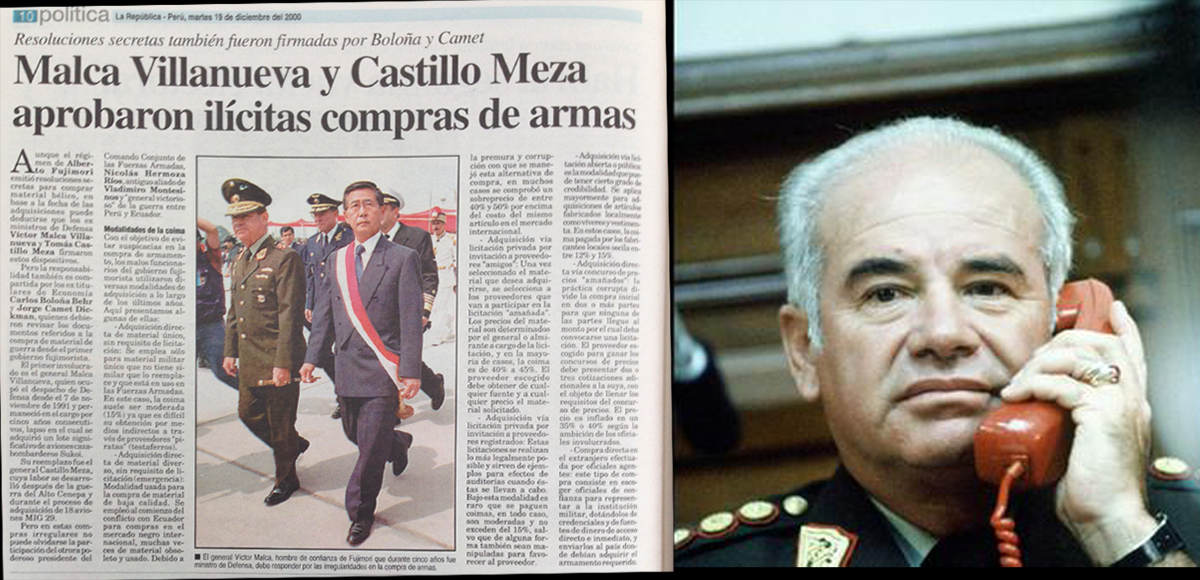Peru orders confiscation of USD 1.5 million stashed in Mexico by a corrupt Army General

In the first such case in the Americas, Peru has issued a judgement ordering the non-conviction based confiscation of over USD 1.5 million in assets frozen in Mexico.
The achievement adds to Peru’s substantial experience and jurisprudence involving its 2019 law of Extinción de dominio. The non-conviction based forfeiture (NCBF) law allows assets of illicit origin to be confiscated in a judicial procedure, even if a criminal conviction is not possible.
The case is one of several that our International Centre for Asset Recovery (ICAR) team in Latin America is supporting through technical assistance and capacity building. It involves money stolen by former Army General Victor Manuel Malca Villanueva during the corrupt government of Alberto Fujimori from 1990–2000.
Malca Villanueva made a series of cash deposits to his account at the Mexican-based Banco Bital while serving there as Ambassador of Peru, which the bank flagged as suspicious and reported to the authorities. Malca Villanueva died in 2015 at a Brazilian seaside resort, but his wife and children remain beneficiaries of the bank account.
Surging ahead in the use of NCBF mechanisms for asset recovery
That Peru has been able to issue this judgement (available here) is a significant achievement in itself. Many countries in Latin America, and indeed in the world, either do not possess such legislation or do not make effective use of it, despite its endorsement in international anti-corruption treaties and standards.
It is an achievement based on Peru’s decision to implement the law strategically through a system of courts, tribunals and capacity building. ICAR has provided support to this effort and continues to contribute to it.
It is also a testimony to the perseverance and commitment of individuals in the Peruvian government and justice system. These include in particular prosecutors Milagros Pereda, Coordinator of the Specialised Prosecutor for Extinción de Dominio in Lima, and Dr Hamilton Castro.
Sharing experiences and knowledge to foster international cooperation
Providing insights into the case is part of Peru’s ongoing efforts to share knowledge and lessons learned as widely as possible, in order to help other jurisdictions seeking to draft or implement NCBF laws as well as foster international cooperation.
In an interview with our Head of Latin America Oscar Solórzano, Dr Castro explains the significance of the Malca case, takes stock of how the law is working in Peru after nearly three years, and gives his perspective on the challenges and opportunities for international cooperation in NCBF cases.
At the Basel Institute and through ICAR, we continuously support the efforts of practitioners in Peru and other countries to share experiences with non-conviction based forms of asset forfeiture. Current initiatives in this regard include:
- our Asset Recovery Knowledge Community in Latin America
- our support to the development of a 1,100-page Compendium of Jurisprudence on Extinción de Dominio
- our participation in the review of UNODC’s Model Law on Extinción de Dominio
- our observer member status in the Asset Recovery Network of GAFILAT, the regional body of the Financial Action Task Force.
We hope that Peru’s success, and its foundations, will inspire other jurisdictions to develop, implement and make good use of NCBF laws to recover stolen assets. These illicit funds would otherwise remain frozen in faraway bank accounts or, worse, in the hands of the corrupt former public officials and their relatives and co-conspirators.
We also hope the increased understanding of the principles behind NCBF laws such as Extinción de dominio – and the safeguards they should and do contain – will encourage requested States to live up to their commitments to provide victim States such as Peru with the widest level of cooperation possible. This applies both during the proceedings and in the execution of NCBF orders.
We look forward to supporting this precedent-setting case, and hope to see the safe return of the stolen money to the people of Peru.
Our technical and policy assistance in Peru, and this interview, are supported by the core donors of the International Centre for Asset Recovery as well as the Swiss State Secretariat for Economic Affairs (SECO) Cooperation in Peru through the multi-year Subnational Strengthening Public Finance Management programme. In addition, we are implementing a separate project of the US Department of State Bureau of International Narcotics and Law Enforcement Affairs (INL), which aims to explore the potential for innovation in asset recovery through NCBF mechanisms in Latin America, Sub-Saharan Africa and Lusophone countries.


